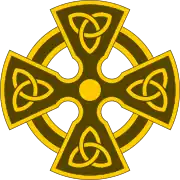| Part of a series on |
| Celtic Christianity |
|---|
 |
| Portal Christianity |
Neo-Celtic Christianity or Contemporary Celtic Christianity are terms used to describe a religious movement to re-assert or restore beliefs and practices that its adherents believe to have originated in Celtic Christianity. Celtic Christianity is a term originally applied to a variety of Christianity which evolved in the British Isles during the first millennium of the Christian era, and particularly during the first half of the first millennium.
The revivalist movement traces its origins to Jules Ferrette (Mar Julius) and Richard Williams Morgan (Mar Pelagius), who established the Ancient British Church in 1858.[1][2]
Contemporary Celtic or neo-Celtic Christianity portrays a gentle, tolerant, 'green', meditative, egalitarian and holistic form of Christian faith and practice.[3] Such a 'Celtic' form of Christianity is seen by some as representing a survival or restoration of an early 'pure' form of Christianity which they hold as having existed in the British Isles long before missions such as Augustine's mission to Canterbury in AD 597 introduced and overlaid Roman forms of Christian faith and practice.[3]
Some consider that the transition from the 'old religion' (i.e. from pre-Christian Celtic beliefs) to Christian faith and allegiance was an easy, smooth and harmonious transition, and that neo-Celtic Christianity or contemporary Celtic Christianity holds a distinctive and unique place within Christianity in that it has allegedly preserved or restored an ancient body of esoteric divine wisdom unknown in other branches of Christianity.[3]
Reincarnation is widely regarded as a Celtic belief in neo-pagan, New Age, and druidic circles. Even in some neo-Celtic Christian circles (contemporary Celtic Christian circles), belief in reincarnation may be retained.[3]
The origins of some contemporary Neo-Celtic beliefs can be traced to the works of Bishop Thomas Burgess, which were further expounded in works such as Richard Williams Morgan's book Saint Paul in Britain.[1][4]
See also
References
- 1 2 Günther H. Thomann (2001). A Short Biography of the Reverend Richard Williams Morgan (c.: 1815-1889), the Welsh Poet and Re-founder of the Ancient British Church: An Enquiry Into the Origins of Neo-Celtic Christianity, Together with a Reprint of Several Works by Richard Williams Morgan and Jules Ferrette, Etc. St. Ephrem's Inst. Retrieved 9 November 2012.
- ↑ Morgan-Guy, John., Book review of "A short biography of the Reverend Richard Williams Morgan (c:1815–1889), the Welsh poet and re-founder of the ancient British Church. An enquiry into the origins of neo-Celtic Christianity, together with a reprint of several works by Richard Williams Morgan and Jules Ferrette, etc. By G. H. Thomann. Pp. iii+133. Solna, Sweden: St Ephrem's Institute, 2001, £10 (paper)." in The Journal of Ecclesiastical History, Volume 54, Issue 01, January 2003, pp 97 - 194.
- 1 2 3 4 John T. Koch (31 December 2005). Celtic culture: a historical encyclopedia. ABC-CLIO. pp. 1623–. ISBN 978-1-85109-440-0. Retrieved 10 November 2012.
- ↑ Pearson, Joanne (27 June 2007). Wicca and the Christian Heritage: Ritual, Sex and Magic. Taylor & Francis. p. 35. ISBN 978-0-415-25413-7. Retrieved 8 November 2012.